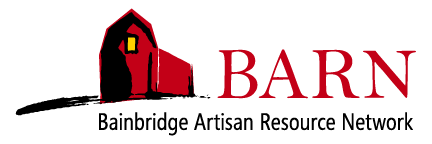
Fiber Arts
Basketry: Woven Wearable Treasures
Create wearable woven art under the guidance of two contemporary plant-fiber artists.
Tuition Assistance and Other Policies
Meeting Times
- Fri, 10/18/2024 9:30 AM - 4:00 PM
- Sat, 10/19/2024 9:30 AM - 4:00 PM
- Sun, 10/20/2024 9:30 AM - 4:00 PM
Fri, 10/18/2024 - Sun, 10/20/2024
Closed
About
Imagine three days of exploring Northwest plant materials and universal weaving techniques with two creative teaching-artists who have spent their lives doing just that! Learn to use an array of fiber techniques to transform small treasures found in nature, or keepsakes and recyclables, into wearable art. The instructors will provide you with a variety of plant materials so you can learn the basics about ethical gathering, as well as storing and preparing roots, limbs, barks, grasses, runners, leaves, and other assorted fibers for weaving. Wire, waxed linen, beads, and found objects will also be available for your use.
Your instructors will focus on one technique at a time, starting with the easiest, including random weave, lashing, looping, knotting, plaiting, cordage-making, coiling, and twining. From creating shiny "Random Weave Wire Nest Pendants" filled with tiny pearl eggs, to making your own "Pussy Willow Earrings," these two seasoned instructors will provide you with plenty of creative inspiration as well as demonstrations, support, and encouragement through a series of delightful woven wearable projects.
Details
- Experience level: All.
- If you're not a BARN member, consider joining to get the members-only price.
- Bring a sack lunch each day. A refrigerator and microwave are available on the lower level.
- Wear comfortable clothing and bring extra layers. The studio can get chilly if outside temperatures are low.
- Bring your readers if you need them for close-up work.
Materials
A materials fee of $40 is included in the cost of this workshop and covers the cost of the instructor provided project materials.
BARN has some tools for you to use, but if you do have jewelry making tools bring your small round tip pliers, small smooth flat needle nose pliers, small wire cutters, and small sharp scissors. A darning needle or big-eyed embroidery needle with a blunt tip, a small hand towel to keep materials damp, a half gallon size zip-lock bag, and a small container for water, would also be handy.
Class Policies
Ages 14 and up are welcome.
BARN Policies
- View BARN's Cancellation and Refund Policy.
- Tuition Assistance is available. Fill out the application before registering.
- BARN is committed to accessibility. We try to make accommodations when requested; the earlier you contact us, the more likely we can help. Please email accessibility@bainbridgebarn.org to find out more or request an accommodation.
- Sensory Statement: Makerspaces like BARN can be noisy and cluttered, smell strongly, and have bright or flickering lights. BARN is not an allergen-free facility. If you have concerns, please email info@bainbridgebarn.org.
Instructors or Guides
Margaret Mathewson
“I look at my current art as a celebration of the contrast between random free flow and exacting tradition. Both inform my work. I love the feel, color and texture of natural materials and found objects. Nothing can really improve on a scene from nature. I just feel I have to try putting together my own pictures.”

Melinda West
Melinda enjoys exploratory art-making with plant fibers and loves sharing the healing qualities of the craft with others. She has taught at the Seattle Art Museum, Olympic College, Coupeville Art Center, North Cascades Institute, Olympic Park Institute, IslandWood, Bainbridge Artisan Resource Network, Heronswood Gardens, and elsewhere. Her award-winning art is on display in public and private collections, and her work is featured in books and magazines. Learn more at https://www.melindawest.com.


Follow Us